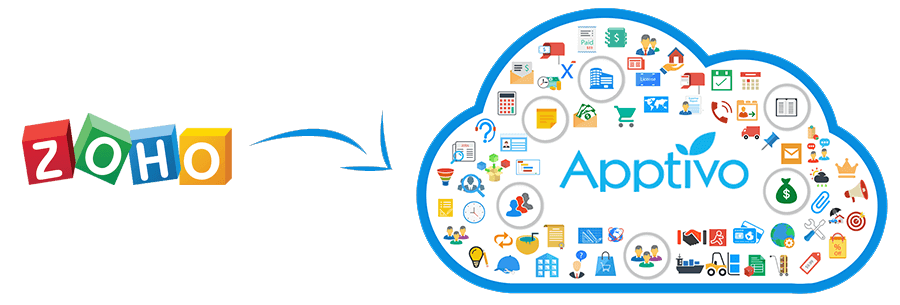1. Storage Limits
When deciding on your preferred business solution, you will be inevitably faced with a dilemma to choose your preferred storage limit. The problem here is that not all businesses know how much they’d need. In addition to this, Software companies don’t offer much storage to their users either. This adds additional knots making it a much-complicated problem than it already is.
To better understand this scenario, let’s take the one storage offer of Zoho CRM. Initially, Zoho CRM users are offered with only 1GB/user. This would be enough for light users. But, a typical salesperson would have to deal with a large number of documents, invoices, and emails daily, and this limit of 1GB will be exhausted at lightning speed. So, when users exceed their limit, the companies are left with no choice but to buy additional storage, and sometimes this could go beyond the price of the Software itself. At this point, the companies cannot switch systems either as they’ve already implemented the system in the work process.
Thus, it is quite evident that even though Zoho CRM claims itself as the operating system for business it isn’t anywhere near perfect and it certainly has issues that make their users quite frustrated.
One such customer posted the following review in G2Crowd:
“Increased costs for additional data storage Could be more user-friendly for external users. Slow product/IT support when the system goes down”
On the other hand, the Zoho CRM alternatives, the Apptivo CRM Software offers its initial Ultimate users with a 10GB storage limit for documents. Unlike Zoho, Apptivo doesn’t place any storage limit on emails and other records. Its integration with Google Drive, Onedrive, and Dropbox makes it a Zoho alternative. Apptivo has made sure its data connectivity is unencumbered.
So if you look at these, Apptivo is a more simple, convenient, and cost-effective alternative to Zoho CRM. With its humongous storage, you can be confident that all of your business will never run out of space and you can always ask more out of it. Apptivo is the truly affordable CRM solution, which has the best of all worlds and that you can eliminate the stress and costs associated with storage limit, managing and acquiring additional storage.
2. Lack of Third-Party Integrations
There are a number of things to consider when building new software for businesses. We’re all aiming to create something which will be popular with customers and readily used. If we want to easily attract new customers and importantly, hang onto them once we’ve got them, we need to consider the right features and customer-centric integrations.
Customer Retention is arguably the most important part and Third-party integrations are becoming an essential ingredient to attract and retain customers. Businesses are looking for ways to streamline their process, so they look for tools that integrate with what they already use. Not all businesses might be willing to dump the system that has been working well for them for years for a new one. It is both time-consuming and pricey. This means if you haven’t got the right integrations in place, you are at risk of higher churn.
Zoho CRM is one such example. With its very limited third-party integrations, it’s customers are getting frustrated as they have to manually work to incorporate their workflows and processes into the new system from their existing system that has been serving well.
Also, though Zone One is a bundle of 35+ apps, it’s not all fully integrated. The third-party app has to be manually integrated with each Zoho CRM app individually. For example, let’s say you’ve integrated Slack in Zoho CRM Books. If you log in to Zoho CRM you will again have to integrate Slack again with Zoho CRM. But in Apptivo, if you integrate Slack it will, by default, be integrated between all the apps.
About the lack of third-party integrations and functionality, one user posted a review:
“However, there are quite a few integrations lacking that can cause some frustration“
Some of the common examples would be its Zoho CRM integration with other accounting applications. Since Zoho CRM has its own accounting application called Zoho CRM Books it’s integrations with other accounting applications in the market is very limited. It’s not as seamless and quicker as it is with its in-house applications. It’s only natural for a company to push its products over the others.
One such frustrated user posted a review on G2Crowd saying:
“It is not very sophisticated with other integration”
So, if you’re a business looking for a solution then Zoho CRM might make you reconsider your options with Zoho competitors. Because another standalone app might put any business off! Whereas Apptivo, a Zoho CRM alternative, is seamlessly integrated with G Suite and Office 365 for contact sync, several major payment gateways for online transactions, and more than 200+ applications directly and indirectly via Zapier and PieSync.
3. Imaginary Data Sync
The concept of an integrated suite of apps is to reduce the workload of business by getting more things done with minimal human intervention. For this to happen, data entered in one app has to be synced with other apps automatically and instantly. Often, these are the metrics used by customers to judge a Software’s ability and functionality.
While Zoho CRM One provides an all-in-one price model and claims to give you 35+ business applications in one suite, it isn’t actually quite true to its letter. What Zoho CRM One does is that they provide a universal dashboard from where you can access each app. When you click an app from the dashboard in Zoho CRM One, it will open a new tab and redirect you to the particular app. So, it is not exactly an integrated suite of apps. Opting for CRM alternatives would be recommended here.
All apps have their own user interface and theme and getting used to it is complicated. Also, it’s not just you, all the users in your organization have to get used to the different UIs. At its core, they are still different individual apps and this creates a broken bridge for data to synchronize between the apps.
For example, to run an email campaign for the contacts in the Zoho Invoice app, the user has to manually export data from Zoho Invoice and import it into Zoho Campaigns. But in Apptivo, a Zoho invoice alternative, applications are seamlessly integrated, allowing you to track the activity of contact in multiple modules including projects, email campaigns, invoices, etc.
Some of the users posted their reviews online saying:
“The integrations and data synchronization is still not perfect”
“Just don’t pay for it yet. Give it a few years.”
Though the price seems attractive, the problem lies with the functionality. In the long run, Zoho CRM proves to be a bad horse to bet at this point. With its broken data synchronization setup and limited integrations, it just increases the human intervention rather than decreasing it. This would eventually make a dent in your business performance. This is where Apptivo separates itself from Zoho CRM as the best CRM alternative with its true seamlessly integrated features between multiple apps.
4. Frustrating Support
Helpdesk support is as important for any organization as it is for a SaaS company. The key to market great Software is to build strong customer support. There are a number of ways to market a product but nothing builds trust like a good old word of mouth, which happens only after a user has not only used your product but also experienced your support responses.
Just like features of a product where customers expect everything to be at one place, they also expect one integrated and unified customer support for all their needs, particularly in the case of a suite of apps.
It would seem that software providers like Zoho CRM would have thought this through. But, no and it’s not as easy as you would think. Because before Zoho CRM One, all the Zoho suite of apps were originally separate individual apps (and still it is) and they all needed an individual support team. When Zoho CRM One was introduced, they tried integrating the features of the apps but not the support team.
To understand this in detail, let’s say you’re testing Zoho CRM One for your business and during which you get stuck in a case in Zoho CRM. Now, you will have to contact the Zoho CRM support team. Next time, you’re having a hard time understanding a feature in one of the other Zoho CRM apps, now you will have to contact the respective app’s support team.
Each app has its own support email addresses and you have to track them individually. Also, not all Zoho CRM apps support live chat support. Support and its quality will vary from one app to another depending on the team.
User guides and FAQs in the Zoho CRM website are for each individual app and there is no one dedicated guide for Zoho CRM One that explains the features and integration capabilities. So, if you have a doubt regarding any integration or data synchronization between two apps then you’ll have to get in touch with either one of the support team. So, it’s basically a merry-go-round-from-hell all over again.
Some of the users took their frustration online:
“WORST SUPPORT TEAM”
“onboarding was nearly a nightmare. It almost made sense to create a monthly budget just for onboarding and constant outside support for the software”
Whereas in Apptivo, a Zoho CRM alternative, all the apps are linked to one centralized support system. So, if you ever get stuck, all you have to do is contact us at the same number or email address every time and live chat is available for all the apps.
Exorbitant Pricing
In addition to features and support, another factor that highly influences a business’s decision is Pricing. The price of the Software should justify the features and functionality it offers. Also, the number of employees or users in an organization plays a vital role as well.
“Unfortunately I believe that the price per user ends up being very expensive”
This is because most organizations do not require every employee to be a user of their business software. But with Zoho CRM One, a business has to purchase licenses for every single employee, even though they don’t need them. This could dramatically increase the overall pricing of the Software budget you’ve set.
Apart from this, every user is given a storage limit of 1GB initially and if one needs to increase the limit they’d have to pay for it. So, when users exceed their limit the companies are left with no choice but to buy additional storage, and sometimes this could go beyond the price of the Software itself. So in the long run, the pricing of the software might not be the same or nowhere near the initial price you paid.
One customer posted in his review online saying:
“don’t pay for it yet. They have a lot of bugs to fix still”
To overcome this, Apptivo, a free alternative to Zoho CRM, encourages businesses to pay for licenses solely for employees who will be using the system. In addition to this, Apptivo also provides flexibility in pricing based on user volume.
5. Exorbitant Pricing
In addition to features and support, another factor that highly influences a business’s decision is Pricing. The price of the Software should justify the features and functionality it offers. Also, the number of employees or users in an organization plays a vital role as well.
“Unfortunately I believe that the price per user ends up being very expensive”
This is because most organizations do not require every employee to be a user of their business software. But with Zoho CRM One, a business has to purchase licenses for every single employee, even though they don’t need them. This could dramatically increase the overall pricing of the Software budget you’ve set.
Apart from this, every user is given a storage limit of 1GB initially and if one needs to increase the limit they’d have to pay for it. So, when users exceed their limit the companies are left with no choice but to buy additional storage, and sometimes this could go beyond the price of the Software itself. So in the long run, the pricing of the software might not be the same or nowhere near the initial price you paid.
One customer posted in his review online saying:
“don’t pay for it yet. They have a lot of bugs to fix still”
To overcome this, Apptivo, a free alternative to Zoho CRM, encourages businesses to pay for licenses solely for employees who will be using the system. In addition to this, Apptivo also provides flexibility in pricing based on user volume.
6. Isolated Features
Features play an important role in decision making. Features are the first things customers look for when they scout a solution. They would want to make sure that the Software can meet all their business requirements and if it has the ability to scale and grow along with them.
You can also find some nitpicking customers who would analyze how frequently Software is being updated and the new features are rolled out. Well, it’s in their best interest. No one would want to be stuck with a Software that could become obsolete in a couple of years.
In the case of Zoho CRM One, since it bundles different individual apps into one, the features and updates depend on each team like Customer Support. Oftentimes, you are stuck between two different development teams to roll out one feature.
To understand the scenario better, let’s assume that you need an invoice consolidating feature in your accounting application. Since it’s an integrated suite of apps, you would naturally expect it to be available in the CRM application as well under a specific customer. But, that is not how Zoho CRM One works. Though the feature is available in the accounting app, the CRM development team has to roll out another update to support the feature in its application. Basically, it’s just one feature but two updates.
Also, some of the customers of Zoho CRM One posted in Capterra saying:
“it currently lacks depth in any major functionality”
“Lack of Budgeting feature and they are ignoring the many requests for it for the past three years”
“email templates are very plastered”
One other major drawback of Zoho CRM One is that customers cannot keep track of the new feature updates. They have to individually visit each app’s website or customer support to keep themselves updated which is practically next to impossible. Nobody ain’t got time for that.
Also, for any new feature requests, you will have to contact each team individually. And, when they do rollout you will have to wait for other development teams to integrate that with their applications. It’s like one big maze where you come back to square one at every single turn.
Whereas in Apptivo, all the updates can be followed on the Blogs page. For any feature requests, all you have to do is get in touch with customer support via email and live chat. One truly centralized solution and a Zoho CRM alternative.









